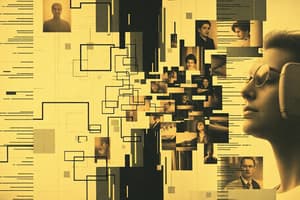Podcast
Questions and Answers
What is the primary role of 'noise' in communication?
What is the primary role of 'noise' in communication?
- To alter or destroy the message being relayed (correct)
- To enhance the clarity of the message
- To simplify the interaction between communicators
- To provide additional context to the message
Which type of noise includes factors like an inaudible speaker or loud sounds in the environment?
Which type of noise includes factors like an inaudible speaker or loud sounds in the environment?
- Physical noise (correct)
- Semantic noise
- Psychological noise
- Grammatical noise
What type of noise occurs due to the misuse of language rules, such as faulty sentence construction?
What type of noise occurs due to the misuse of language rules, such as faulty sentence construction?
- Semantic noise
- Physical noise
- Grammatical noise (correct)
- Phonological noise
How can a teacher reduce the impact of noise in a classroom setting?
How can a teacher reduce the impact of noise in a classroom setting?
What does the concept of 'span of control' primarily refer to?
What does the concept of 'span of control' primarily refer to?
In what year was the concept of 'span of control' developed?
In what year was the concept of 'span of control' developed?
Which barrier to communication might involve a person's emotional or mental state?
Which barrier to communication might involve a person's emotional or mental state?
What can be an effect of noise on communication between teachers and students?
What can be an effect of noise on communication between teachers and students?
What is the primary focus of the digital language approach (DLA)?
What is the primary focus of the digital language approach (DLA)?
What does Computer-Assisted Language Learning (CALL) primarily involve?
What does Computer-Assisted Language Learning (CALL) primarily involve?
What is a key characteristic of the Communicative Language Teaching (CLT) approach?
What is a key characteristic of the Communicative Language Teaching (CLT) approach?
What is one point to consider for enhancing effective communication in language learning?
What is one point to consider for enhancing effective communication in language learning?
Which of the following is NOT mentioned as a point to consider in enhancing effective communication?
Which of the following is NOT mentioned as a point to consider in enhancing effective communication?
Which approach emphasizes learners being actively involved in oral communication?
Which approach emphasizes learners being actively involved in oral communication?
What is the role of digital communication technologies mentioned in the content?
What is the role of digital communication technologies mentioned in the content?
What aspect of language learning does the content primarily emphasize?
What aspect of language learning does the content primarily emphasize?
What does span of control in classroom instruction primarily involve?
What does span of control in classroom instruction primarily involve?
Which of the following is NOT a barrier to effective communication in classroom instruction?
Which of the following is NOT a barrier to effective communication in classroom instruction?
What role does classroom talk play in students' learning?
What role does classroom talk play in students' learning?
Which instructional strategy encourages oral communication among students?
Which instructional strategy encourages oral communication among students?
What is a key feature of Information and Communications Technology (ICT) in educational settings?
What is a key feature of Information and Communications Technology (ICT) in educational settings?
What should teachers do to overcome barriers to effective instruction?
What should teachers do to overcome barriers to effective instruction?
Which method is suggested to facilitate students' effective use of language?
Which method is suggested to facilitate students' effective use of language?
What characteristic of classroom environments can hinder effective communication?
What characteristic of classroom environments can hinder effective communication?
What is the primary focus of Task Based Language Teaching (TBLT)?
What is the primary focus of Task Based Language Teaching (TBLT)?
Which task is NOT typically associated with Task Based Language Teaching?
Which task is NOT typically associated with Task Based Language Teaching?
How does scaffolding benefit learners in a language class?
How does scaffolding benefit learners in a language class?
What is an effective way to help learners communicate independently?
What is an effective way to help learners communicate independently?
Which of the following is NOT a method to motivate learners to think independently?
Which of the following is NOT a method to motivate learners to think independently?
In the context of Task Based Language Teaching, students are encouraged to do which of the following?
In the context of Task Based Language Teaching, students are encouraged to do which of the following?
What role does feedback play in language learning tasks?
What role does feedback play in language learning tasks?
Which strategy can help learners feel they are in an English-speaking environment?
Which strategy can help learners feel they are in an English-speaking environment?
Study Notes
Noise in Communication
- Noise is anything that can disrupt the intended message in communication.
- It can be physical, psychological, or linguistic.
- Physical noise includes audible or inaudible sounds distracting from the speaker's message
- Psychological noise includes mental or emotional barriers, preventing the receiver from truly understanding the message.
- Linguistic noise involves language-based barriers, which could be semantic, grammatical, or phonological.
- Semantic noise occurs when the language used is too complex or unfamiliar to the receiver.
- Grammatical noise happens when the message is poorly structured, has incorrect grammar, or uses punctuation incorrectly.
- Phonological noise relates to pronunciation difficulties, where the words are not pronounced correctly.
Span of Control
- Developed in 1922 by Sir Ian Hamilton.
- Refers to the number of interactions between a manager and their subordinates, as well as the number of direct reports a manager has in an organization.
- Important for understanding organizational design and behavior.
- In education, it relates to the teacher-student ratio, the interaction between the teacher and students, and the relationship between them with respect to communication and language use in the learning process.
The Teacher's Role in Encouraging Oral Communication
- The teacher plays a crucial role in fostering student communication, encouraging them to learn, reflect, and share their ideas, knowledge, and understanding.
- Teachers should utilize effective strategies to promote oral communication.
- Some examples of effective strategies include pair work, small group discussions, whole-class discussions, presentations, debates, question-and-answer sessions, storytelling, and role-playing.
Barriers to Effective Communication and Instruction Delivery
- Barriers include:
- Noise
- Poor voice projection by the instructor
- Overcrowded classrooms
- Unconducive learning environments
- Difficult and ambiguous expressions by instructors
- Distractions from the subject matter
- Unhealthy learning environment
- Incompetence of the teacher
- Bad pronunciation
- Lecturing at odd hours
Modern Communication Techniques in Language Instruction
- Information and Communications Technology (ICT): Uses electronic devices to store, retrieve, manipulate, transmit, and receive data and information electronically. Includes traditional computer-based technologies like office applications (word processing, spreadsheet, etc.) and specialized applications (accounting packages, engineering, language packages, etc.) and newer digital communication technologies (phones and wireless signals).
- Digital Language Approach (DLA): Utilizes digital photography and computer creativity software to enhance language learning. Recognized as a powerful strategy for providing unique and contextualized learning opportunities.
- Computer-Assisted Language Learning (CALL): Uses computer applications and software for language teaching and learning. Various applications exist, helping teachers facilitate the teaching and learning of all subjects.
- Communicative Language Teaching (CLT): Emphasizes interaction as both the means and the ultimate goal of language study. Prioritizes language use and communicative language in the classroom. Learners participate actively in oral communication.
- Task Based Language Teaching (TBLT): Focuses on authentic language use through meaningful tasks. Students are given tasks to perform, promoting target language use for communicative purposes. It’s a child-centered method, encouraging students to use language in meaningful ways.
Helping Learners Think and Communicate Independently
- Closely related to motivation, assistance learners need to be given to excel in the classroom.
- Scaffolding and encouragement help learners become more independent.
- Key ways to foster independent communication include:
- Providing learners with ample exposure to language so they become familiar with its sounds.
- Giving opportunities for language use through group or pair work.
- Sharing resources that support learning both in and outside the classroom.
- Offering learners choice and allowing them to choose activities that appeal to them
- Helping learners assess their strengths and weaknesses.
- Encouraging communication in groups or pairs, to gather information and receive feedback.
Studying That Suits You
Use AI to generate personalized quizzes and flashcards to suit your learning preferences.
Related Documents
Description
Explore key concepts in communication, including the various types of noise that can affect message transmission. Additionally, learn about the span of control and its implications in management practices. This quiz will test your understanding of these fundamental topics.




